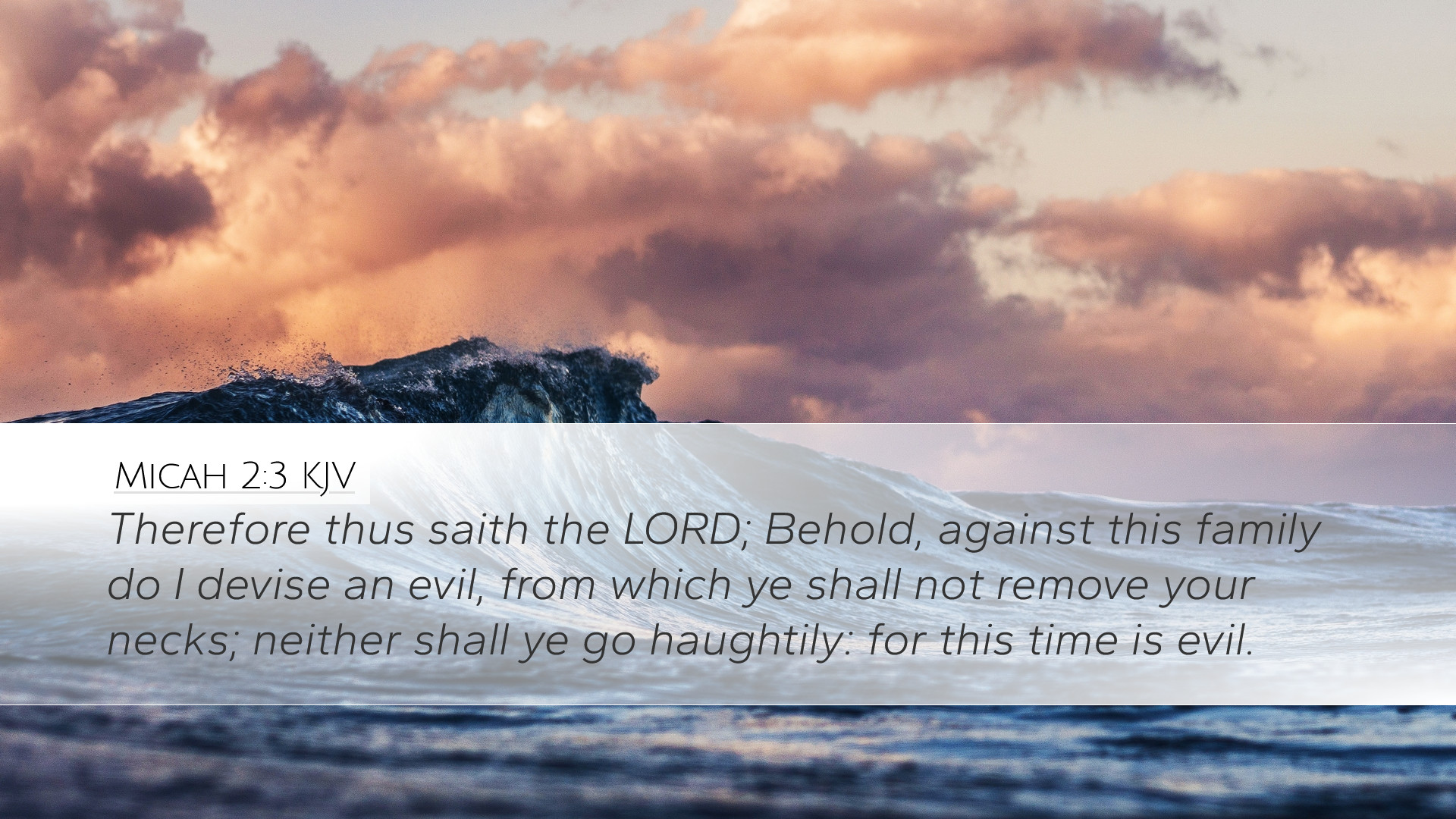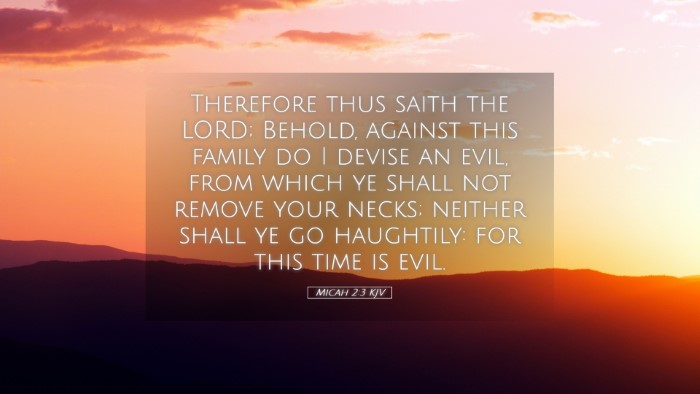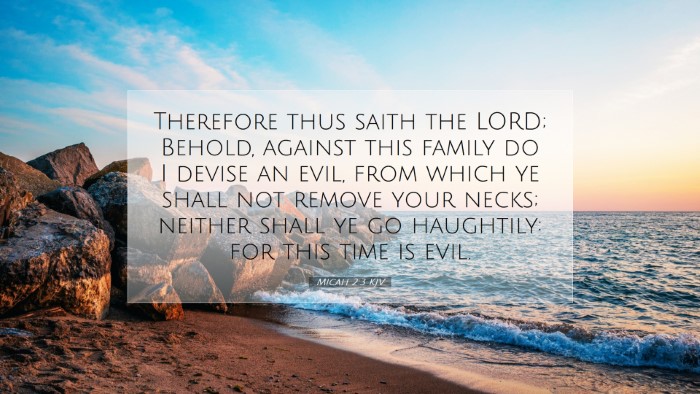Old Testament
Genesis Exodus Leviticus Numbers Deuteronomy Joshua Judges Ruth 1 Samuel 2 Samuel 1 Kings 2 Kings 1 Chronicles 2 Chronicles Ezra Nehemiah Esther Job Psalms Proverbs Ecclesiastes Song of Solomon Isaiah Jeremiah Lamentations Ezekiel Daniel Hosea Joel Amos Obadiah Jonah Micah Nahum Habakkuk Zephaniah Haggai Zechariah MalachiMicah 2:3
Micah 2:3 KJV
Therefore thus saith the LORD; Behold, against this family do I devise an evil, from which ye shall not remove your necks; neither shall ye go haughtily: for this time is evil.
Micah 2:3 Bible Commentary
Bible Commentary on Micah 2:3
Verse: Micah 2:3 - "Therefore thus saith the Lord; behold, against this family do I devise an evil, from which ye shall not remove your necks; neither shall ye go haughtily: for this time is evil."
Introduction
The Book of Micah is a powerful compilation of prophetic messages that showcase God's judgment against Israel's sinfulness and His beckoning for true repentance. Micah 2:3 stands out as a stark warning from God to His people regarding impending judgment. This commentary analyzes the verse in depth, drawing from public domain commentaries for a comprehensive exploration.
Contextual Background
Micah prophesied during a time of societal decay, particularly amidst the corruption of leaders and the exploitation of the poor. The judgement foretold by Micah is not only a call for accountability but serves to illustrate God's unwavering stance against injustice.
- Historical Setting: Understanding the socio-political context of Micah's time greatly enhances our grasp of the prophetic words. Israel and Judah faced threats from external enemies while struggling with internal moral decay.
- Literary Structure: Micah’s prophecies contain a mixture of woe oracles and promises of restoration, making his messages poignant yet ultimately hopeful.
Analysis of Micah 2:3
Micah 2:3 directly addresses the families of Israel, emphasizing God's deliberate purpose of judgment. The passage can be segmented into several significant components:
Divine Decree of Judgment
“Therefore thus saith the Lord; behold,” indicates a serious proclamation from God. According to Matthew Henry, this opening signifies a transition from general admonitions to a specific, powerful announcement of divine retribution. This summons the attention of listeners, insisting they regard God’s unwavering authority.
“Against this family do I devise an evil”
In assessing the term "family," Albert Barnes notes that it could refer to the ruling class or the leading figures contributing to social injustice. The "evil" devised here doesn't imply a moral evil but rather the calamity and judgment that God will bring as a consequence of their actions. This alerts us to the serious repercussions faced by those who enact wickedness against God's commands.
Inescapable Fate
“From which ye shall not remove your necks;” signifies that the judgment is inescapable. Adam Clarke emphasizes the hopelessness of the people's situation, as they are shackled by their sins and will experience the weight of God's judgment. This phrase portrays a vivid image of captives under the yoke of their own transgressions.
“Neither shall ye go haughtily”
This warning against pride connects to the broader themes of humility and repentance. In the face of divine judgment, the people are reminded that their arrogance will give way to their disgrace. According to Matthew Henry, the reference to haughtiness highlights the futility of self-reliance in times of divine reckoning.
“For this time is evil”
This phrase resonates deeply with the condition of society at that time. Albert Barnes asserts that recognizing the present era as "evil" calls for discernment. God’s admonition is not solely for past sins but an acknowledgment of a continued trajectory of wrongdoing. The people are warned that their current state necessitates urgent repentance and turning back to God.
Theological Implications
Micah 2:3 imparts critical theological insights for contemporary scholars and pastors. These implications can be categorized into a few profound themes:
- The Sovereignty of God: This verse affirms God’s supreme authority over human affairs and His ability to effect judgment as He sees fit.
- Justice and Injustice: The broader context emphasizes God's commitment to justice, especially concerning the marginalized and oppressed populations.
- Call to Repentance: The passage acts as a forensic call to the people of Israel, urging them to re-evaluate their standing with God and seek repentance.
- Consequences of Sin: It serves as a reminder that disobedience and pride will inevitably lead to calamity; hence, a humble return to God's ways is essential.
Application for Today
The messages drawn from Micah 2:3 are equally relevant for today. Pastors and theologians are encouraged to reflect on the following applications:
- Assessing Leadership Roles: Just as Micah called out the leaders of Israel, today’s leaders must examine their roles in society and church, avoiding exploitation and corruption.
- Emphasizing Humility: The call against haughtiness reveals the necessity of humility in walking with God and serving others.
- Understanding Impending Judgment: While the New Testament teaches grace, it also holds firms to accountability, and hence preachers ought to convey God’s justice alongside His mercy.
- Encouraging Authentic Repentance: Those teaching from Micah should call their congregations to true, heart-felt repentance rather than mere external conformity.
Conclusion
In summary, Micah 2:3 communicates a powerful, multi-faceted message concerning divine justice, societal responsibility, and the weighty consequences of sin. By drawing on insights from Matthew Henry, Albert Barnes, and Adam Clarke, this commentary aims to challenge scholars, pastors, and students to not only understand this verse in its historical context but also apply its truths diligently within contemporary settings.


